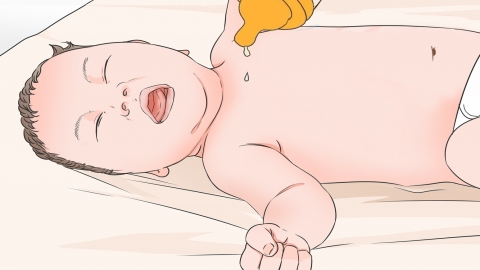What should I do if my baby has long-term diarrhea?
Long-term diarrhea in infants may be caused by overfeeding, lactose intolerance, dietary issues, intestinal flora imbalance, rotavirus infection, etc. It requires management based on specific circumstances. Parents are advised to take their child to the hospital as soon as possible to determine the cause and follow medical advice for appropriate treatment.

1. Overfeeding: Excessive milk consumption, eating too much solid food, or drinking too much fruit juice may all lead to diarrhea in infants, which may be accompanied by symptoms such as abdominal distension and vomiting. Adjust feeding amounts, adopt a small frequent meal pattern, and avoid overfeeding. For infants who have started complementary feeding, attention should be paid to the quantity and type of complementary foods, gradually increasing them to avoid introducing too much at once.
2. Lactose intolerance: Infants have limited ability to digest lactose. Excessive lactose intake may result in undigested lactose fermenting in the intestines, producing gas and acidic substances that irritate the intestinal mucosa, accelerate intestinal motility, reduce water and electrolyte absorption, and cause diarrhea. It is recommended to limit lactose intake and choose low-lactose or lactose-free dairy products.
3. Dietary issues: Unfresh food may contain bacteria or toxins; allergenic foods may trigger immune responses; and high-sugar foods may alter intestinal osmotic pressure, potentially leading to diarrhea. It is recommended to adjust the infant's diet, ensure food freshness and hygiene, avoid allergenic foods, and control sugar content in meals.
4. Intestinal flora imbalance: Factors such as antibiotic use and improper diet may lead to intestinal flora imbalance in infants, disrupting the micro-ecological balance in the gut, increasing harmful bacteria, and decreasing beneficial bacteria, which may cause diarrhea accompanied by symptoms such as indigestion and abdominal distension. It is recommended to use medications such as lactobaculin tablets, Bacillus subtilis and Enterococcus faecalis viable bacteria granules, and Bifidobacterium viable capsules under a doctor's guidance to relieve discomfort.
5. Rotavirus infection: Rotavirus is one of the most common causes of diarrhea in infants and is transmitted via the fecal-oral route, causing acute gastroenteritis, diarrhea, and possibly accompanied by fever, vomiting, and abdominal pain. Parents may administer medications such as Bifidobacterium triple viable capsules, loperamide capsules, and smectite powder according to medical instructions.
Parents should pay attention to the infant's dietary hygiene and feeding methods, avoiding overfeeding and consumption of contaminated food.





